Timetable
Log in to star items and build your individual schedule.
-
Monday
21 June -
Tuesday
22 June -
Wednesday
23 June -
Thursday
24 June -
Friday
25 June -
Monday
28 June -
Tuesday
29 June -
Wednesday
30 June -
Thursday
1 July -
Friday
2 July
Time zone: Europe/London
We invited all members and delegates from the Global South to join DSA Council members to discuss how the DSA might be able to enhance its interaction with those based in the Global South.
Meeting Chair: Tuesday Gichuki (DSA Council - global South representative)
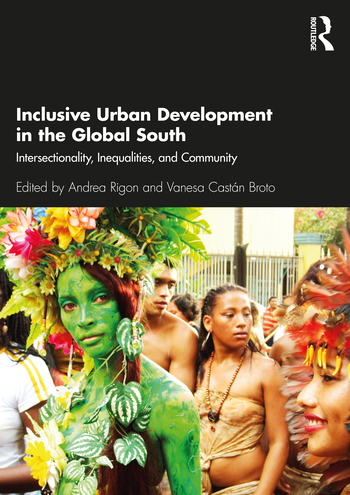
Inclusive Urban Development in the Global South: Intersectionality, Inequalities, and Community
Edited By Andrea Rigon, Vanesa Castán Broto
Inclusive Urban Development in the Global South emphasizes the importance of the neighbourhood in urban development planning, with case studies aimed at transforming current intervention practices towards more inclusive and just means of engagement with individuals and communities. The chapters explore how diversity of gender, class, race and ethnicity, citizenship status, age, ability, and sexuality is taken (or not taken) into account and approached in the planning and implementation of development policy and interventions in poor urban areas. The book employs a practical perspective on the deployment of theoretical critiques of intersectionality and diversity in development practice through case studies examining issues such as water and sanitation planning in Dhaka, indigenous rights to the city in Bolivia, post-colonial planning in Hong Kong, land reform in Zimbabwe, and many more. The book focuses on radical alternatives with the potential to foster urban transformations for planning and development communities working around the world.
 This book focuses on the influence of philanthropic foundations in global development, and on how the global south has engaged with them.
This book focuses on the influence of philanthropic foundations in global development, and on how the global south has engaged with them.
The idea of corporate philanthropy stretches back a long way, with the late 19th industrialist Andrew Carnegie seeing it as an important obligation of the very wealthy. In the modern day, Bill Gates has taken up this call, suggesting that the very wealthy should donate half their wealth to philanthropic causes, and endowing his own foundation with something in the order of $50 billion. This book brings together case studies of the most influential of these foundations over the last one hundred years: the Rockefeller, Ford, and Gates' Foundations, investigating their impact on education and research, health and agriculture. The book concludes by asking whether global south foundations such as Al Waleed Philanthropies, Tata Trusts, and those from China may point to the future of global philanthropic foundations.
The sheer scale of resources that foundations can devote to their work results in significant influence in global politics, to the point that Foundations can drive and even set government policy. This influence is likely to grow in the post-Covid environment, making this book an important resource for researchers, practitioners and policy makers working on global development. See link:
Philanthropic Foundations in International Development: Rockefeller, F (routledge.com)
The publishing sessions consist of two 1 hour sessions. In this first session the editors of some leading journals in development studies will provide advice on effective publishing strategies. This is aimed particularly at PhD students and early career researchers (ECRS). All are welcome to attend to hear their tips and then the editors will take questions.
There is a short 15 min break before the second session.
In this second publishing session the representatives of a few book publishers will provide advice on effective publishing strategies. This is aimed particularly at PhD students and early career researchers (ECRs). Everyone is welcome to attend to hear their tips and the publishers will then take questions.
The 2 publishing sessions will take place in the one Zoom meeting room, so when you click the link below the start time will say 13:00 but do not worry the book section will only start at 14:15!
This session is by invitation only. Entry only permitted for successful notified applicants.
Group 1 with Paul Gilbert
Group 4 with Prathivadi Anand
We invite all DSA student members to meet with the DSA Council student representatives to discuss ways that students can interact more effectively with the DSA.
Book event: Development, (Dual) Citizenship and Its Discontents in Africa
Speaker:
Robtel Neajai Pailey, London School of Economics and Political Science
Panellists:
Thabani Mutambasere, University of Sussex
Kirstie Kwarteng, SOAS, University of London
Natasha Dyer, University of Edinburgh
Sibongile Zulu, University of Oxford
Chair: Laura Hammond, SOAS, University of London
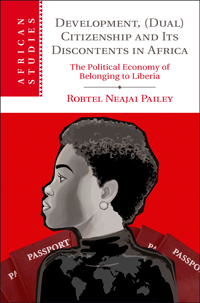 In Development, (Dual) Citizenship and Its Discontents in Africa: The Political Economy of Belonging to Liberia (Cambridge University Press, 2021), Robtel Neajai Pailey draws on rich life histories from over two hundred in-depth interviews in West Africa, Europe, and North America to examine socio-economic change in Liberia, Africa’s first black republic, through the prism of citizenship. Marking how historical policy changes on citizenship and contemporary public discourse on dual citizenship have impacted development policy and practice, Pailey reveals that as Liberia transformed from a country of immigration to one of emigration, so too did the nature of citizenship, thus influencing claims for and against dual citizenship. She develops a new model for conceptualising citizenship within the context of crisis-affected states while offering a compelling critique of the neoliberal framing of diasporas and donors as the panacea to post-war reconstruction.
In Development, (Dual) Citizenship and Its Discontents in Africa: The Political Economy of Belonging to Liberia (Cambridge University Press, 2021), Robtel Neajai Pailey draws on rich life histories from over two hundred in-depth interviews in West Africa, Europe, and North America to examine socio-economic change in Liberia, Africa’s first black republic, through the prism of citizenship. Marking how historical policy changes on citizenship and contemporary public discourse on dual citizenship have impacted development policy and practice, Pailey reveals that as Liberia transformed from a country of immigration to one of emigration, so too did the nature of citizenship, thus influencing claims for and against dual citizenship. She develops a new model for conceptualising citizenship within the context of crisis-affected states while offering a compelling critique of the neoliberal framing of diasporas and donors as the panacea to post-war reconstruction.
During this Development Studies Association 2021 pre-conference event, Pailey will converse about the major findings of her monograph with early career scholars in UK-based Development Studies/International Development departments.
Click here for more information about the book and to download the Introduction free of charge.
This session is by invitation only. Entry only for successful notified applicants.
Group 2 with Amal Chammas
Group 3 with Laura Camfield
Group 5 with Keetie Roelen
All Masterclass participants gather in plenary to discuss their various topics and issues.
This session is by invitation only. Entry only for successful notified applicants.
Book event: Marx in the Field
Chair: Alessandra Mezzadri
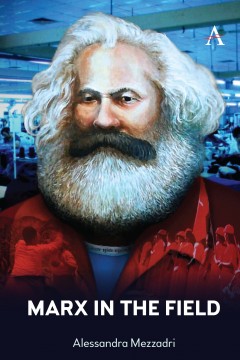 This session introduces the key features of the book Marx in the Field (Anthem, 2021), its relevance for Development Studies and Economics, and will offer insights from some of the contributors to the volume. The objective of the book, as well as this presentation, is stressing the centrality of Marx's concepts and approach for concrete field-based research on the global development process. The contributors who will intervene in the session are listed below.
This session introduces the key features of the book Marx in the Field (Anthem, 2021), its relevance for Development Studies and Economics, and will offer insights from some of the contributors to the volume. The objective of the book, as well as this presentation, is stressing the centrality of Marx's concepts and approach for concrete field-based research on the global development process. The contributors who will intervene in the session are listed below.
Lorena Lombardozzi is a Lecturer in Economics at the Open University and has held teaching positions at SOAS and City, University of London. Lorena has also worked as a development economist in Argentina and Uruguay in 2014, in Uzbekistan for UNODC Central Asia from 2010 to 2012, and between 2007 and 2010 with the European Commission and the Italian Ministry of Foreign Affairs. Her research interests include theories of international political economy; growth and distribution in post-Soviet spaces, planned economies, and Europe; and feminist economics, labour and industrial policy.
Alessandra Mezzadri is Senior Lecturer in Development Studies at SOAS, London, UK. Her research interests focus on global commodity chains and labour regimes; the global garment industry; labour standards, CSR, Modern Slavery and ethical consumerism; feminisms in development and social reproduction approaches; and India’s political economy. She is the author of The Sweatshop Regime: Labouring Bodies, Exploitation and Garments 'Made in India' (Cambridge University Press, 2017, 2020). She is the editor of Marx in the Field.
Farai Mtero is Senior Researcher at the Institute for Poverty, Land and Agrarian Studies (PLAAS) at the University of the Western Cape, South Africa where he undertook research for his PhD. Farai’s research focuses on redistributive land reform, rural livelihoods, class formation and agrarian change. His work uses political economy theory and analysis to understand processes of agrarian change in contemporary societies. He is currently working on land reform in South Africa and is investigating who is benefitting from land redistribution and the nature and extent of elite capture of land reform.
Susan Newman is Professor of Economics at the Open University, UK. She held prior posts at the University of the West of England, at the Institute of Social Studies (ISS) in The Hague, Netherlands, and at the University of Witzwaterstrand, Johannesburg, South Africa. Susan has published articles on the political economy of agricultural commodity chains as well as post-Apartheid industrial development in South Africa. Her work critically engages with mainstream economic approaches and draws from various traditions in classical political economy, including Marx. It has been published in numerous academic journals, like Development and Change, Economic Geography, Journal of Social and Economic Policy and Review of Radical Political Economics. She has contributed to the Elgar Companion to Marx’s Economics.
Sara Stevano is a development and feminist political economist, with interdisciplinary skills in the field of anthropology. She is a Lecturer in Economics at SOAS, London, UK, after holding different teaching and research positions the University of the West of England (UWE), Bristol, and King’s College, London. Her areas of study are the political economy of labour, food and nutrition, social reproduction, gender analysis and research methodology (including mixed methods) for political economy. Her work focuses on Africa, in particular Mozambique and Ghana, and has been published in international journals including The Journal of Development Studies, Cambridge Journal of Economics, Feminist Economics and World Development.
Click here for more information about the book
Opening words from Samuel Hickey (President, Development Studies Association, University of Manchester), Frances Bowen (Pro-Vice Chancellor of Social Sciences, University of East Anglia) and the conference convenors Laura Camfield (University of East Anglia) and Ben Jones (University of East Anglia).
Opening words on behalf of Journal of Development Studies by Oliver Morrissey
Historical perspective on pandemics across disciplines
Bringing together a development studies researcher who works on recovery from disasters with a historian, a novelist and a public health professor to look at the role of history and art in understanding and responding to Covid-19.
Keynotes:
 Mark Bailey is a Professor of Late Medieval History at the University of East Anglia. In 2019 he was the James Ford Lecturer in British History at the University of Oxford, and a Visiting Fellow of All Souls College, exploring the impact of the Black Death on the society and economy of fourteenth-century England.
Mark Bailey is a Professor of Late Medieval History at the University of East Anglia. In 2019 he was the James Ford Lecturer in British History at the University of Oxford, and a Visiting Fellow of All Souls College, exploring the impact of the Black Death on the society and economy of fourteenth-century England.
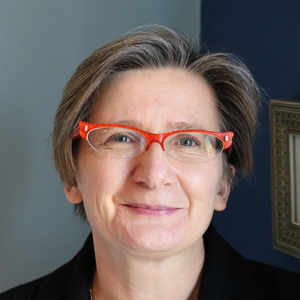 Sarah Hawkes is the Director of the Centre for Gender and Global Health, and a medical doctor with a degree in sociology and a PhD in epidemiology. She is Professor of Global Public Health at University College London where she leads a research theme analysing the use of evidence in policy processes, particularly in relation to gender and health, and sexual health. She has lived and worked for much of the past 20 years in Asia, where she has gathered evidence, built capacity and helped develop policy for programmes focusing on gender, sexual health and human rights. She works closely with national governments, research organisations, WHO and UNFPA in Asia and the Middle East.
Sarah Hawkes is the Director of the Centre for Gender and Global Health, and a medical doctor with a degree in sociology and a PhD in epidemiology. She is Professor of Global Public Health at University College London where she leads a research theme analysing the use of evidence in policy processes, particularly in relation to gender and health, and sexual health. She has lived and worked for much of the past 20 years in Asia, where she has gathered evidence, built capacity and helped develop policy for programmes focusing on gender, sexual health and human rights. She works closely with national governments, research organisations, WHO and UNFPA in Asia and the Middle East.
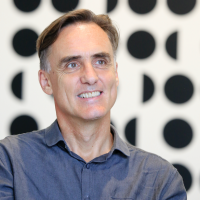 Paul Heritage is the Director of the People’s Palace Projects and Professor of Drama and Performance at Queen Mary University of London. For over three decades, Paul Heritage has created cultural projects as an investigation of the power of the arts in social change, including award-winning HIV/AIDS, education and human rights work. Paul is noted for his arts-based prison projects in Britain and Brazil and his work with AfroReggae in Brazil and the UK from 2001-2012. In recent years, he has focused increasingly on the relationships between arts and wellbeing, Creative Economy, preservation and artistic exchange between artists and cultural agents in Brazil and the UK and indigenous communities in Central Brazil. This included arts-based engagements with women’s experience of gender violence and acting as producer for a group of homeless choirs, Corais Uma Só Voz.
Paul Heritage is the Director of the People’s Palace Projects and Professor of Drama and Performance at Queen Mary University of London. For over three decades, Paul Heritage has created cultural projects as an investigation of the power of the arts in social change, including award-winning HIV/AIDS, education and human rights work. Paul is noted for his arts-based prison projects in Britain and Brazil and his work with AfroReggae in Brazil and the UK from 2001-2012. In recent years, he has focused increasingly on the relationships between arts and wellbeing, Creative Economy, preservation and artistic exchange between artists and cultural agents in Brazil and the UK and indigenous communities in Central Brazil. This included arts-based engagements with women’s experience of gender violence and acting as producer for a group of homeless choirs, Corais Uma Só Voz.
Chair:
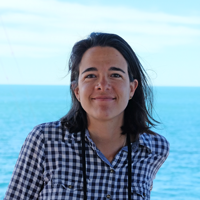 Teresa Armijos Burneo is a Lecturer in Natural Resources and Development at the School of International Development. She is a social scientist, with more than 10 years of experience in interdisciplinary research that critically explores the intersection between the environment and development. Her research combines approaches from political ecology, development studies, history and decolonial theories to study disaster risk, and the politics of resource management. Teresa’s research applies participatory methodologies and the creative arts to co-produce knowledge with those most affected by environmental change. She has worked in several countries in Latin America and the Caribbean, including Ecuador, Peru, Colombia, St. Vincent, Montserrat and Guatemala.
Teresa Armijos Burneo is a Lecturer in Natural Resources and Development at the School of International Development. She is a social scientist, with more than 10 years of experience in interdisciplinary research that critically explores the intersection between the environment and development. Her research combines approaches from political ecology, development studies, history and decolonial theories to study disaster risk, and the politics of resource management. Teresa’s research applies participatory methodologies and the creative arts to co-produce knowledge with those most affected by environmental change. She has worked in several countries in Latin America and the Caribbean, including Ecuador, Peru, Colombia, St. Vincent, Montserrat and Guatemala.
Sponsored by Journal of Development Studies
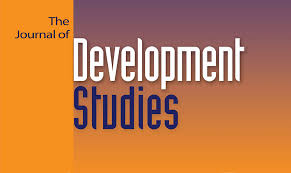
What work of fiction has most influenced you? Is it a play, a poem, a novel, a comic book? How does it shape your thinking about international development?
This networking event is organised with a literary theme to help break the ice and get the conversation going. With the help of a facilitator we will get the chance to meet a range of colleagues for the first time. We will also get the chance to use literature to deepen connections and meet others through a virtual book club.
Moderator: Ben Jones/Laura Camfield
Hear from Development in Practice's new Editor-in-Chief, Patrick Kilby, about the journal's future plans and meet their new team.
DSA President Sam Hickey will introduce this networking event to attendees. With similarities to a speed dating format, during this session you can join a virtual networking table and meet other delegates at random. Each networking session is just a few minutes long and you will have the chance to meet 3 other delegates at your table. During that time you can have a brief video chat with the others, swap details if you wish and then when the time runs out, you will be automatically reallocated to another 'table' with 3 different delegates in the following short session. This continues for the full hour. You can of course enter or leave whenever you like but over 1 hour you have the chance to meet 30-40 other delegates! Do come along and give it a try!
It will be very straightforward but if you would like, you can read more about how the networking tables in Whova work beforehand.
Almost a century has passed since W.E.B. Du Bois (1925) wrote about the global 'colour-line' and nearly 50 years since Guyanese Marxist scholar and activist Walter Rodney (1972) wrote How Europe Underdeveloped Africa, explaining how the whole edifice of European capitalism was built upon the profits of Atlantic slavery and colonialism.
Mapping the inextricable relationship between race and capital and what this means for development is an urgent imperative. Extensive scholarship—including though not limited to Cedric J. Robinson's (1983) seminal work on 'racial capitalism'—has theorised the interdependencies of race, capital and imperialism in which development remains embedded. Yet much discussion of racism in development continues to exclude questions of both the materiality and globality of race from its purview.
In Roundtable 2 of the Race and Development Roundtable Series, we will address these provocations:
1) Can racism embedded 'in' development be unsettled and challenged without simultaneously exposing the racism 'of' development?
2) How do we analyse racialised processes of extractivism, accumulation by dispossession, and climate injustice which the development complex continues to extend and facilitate?
3) How do we think through the notion of 'unsettling' development in the context of historical and ongoing settler colonialism(s)?
4) How do we trace 'racial capitalism' as simultaneously embedded in particular social formations and operating at a global level?
5) How is development 'unsettled' within contemporary abolitionist, reparationist and revolutionary anti-imperialist movements?
Convenors:
Robtel Neajai Pailey (London School of Economics and Political Science)
Kalpana Wilson (Birkbeck, University of London)
Kamna Patel (University College London)
Althea-Maria Rivas (SOAS)
Jenna Marshall (University of Kassel)
Discussants:
Keston Perry (University of the West of England)
Firoze Manji (Carleton University)
Gargi Bhattacharyya (University of East London)
Zoé Samudzi (University of California, San Francisco)
Unearthing Peacebuilding Counter-Narratives in South Tolima, Colombia, through Transformative Action Research
Convenors: Iokiñe Rodriguez and John Jairo Uribe
Speakers: Cristina Sala, Nohora Barros, Santiago Padilla and María del Pilar Salamanca
Moderator: Teresa Armijos
Discussant: Ulrike Theuerkauf
Colombia has been the site of protracted civil war and multiple peacebuilding attempts over the past five decades. From August 2018 to May 2021, members from a range of grassroots and civil society organizations in South Tolima (Colombia) have been working with university staff at the University of Ibagué (Colombia) and researchers at the University of East Anglia (UK) to analyze local peacebuilding dynamics in the municipalities of Ataco, Chaparral, Planadas and Rioblanco. In a joint research project, they have sought to “unsettle development studies”, by going beyond third-party accounts of political developments in war-affected societies, and instead amplifying the voice of those who have experienced the war and are contributing to peacebuilding efforts first-hand. This entailed a) the use of a range of participatory methods, including participatory photography, videography, creative writing and social cartography; b) close collaboration between peacebuilding practitioners, scholars and research participats; and c) inclusive co-production of knowledge among everyone involved in the project.
This roundtable will bring together community and university researchers that took part in this participatory research project to showcase some of the videos, photographs, maps and verbal testimonials that give visibility to the different ways in which communities have been building peace amidst violence over the last decades. These materials illustrate how residents of Ataco, Chaparral, Planadas and Rioblanco connect with their physical and emotional environment, to make sense of a violent past, re-signify their identities and build sustainable peace for the future.
Critical scholars have traced the colonial origins of development thought, copying its racist tendencies and racialised anxieties onto a postcolonial world. Yet, within development policy and academic circles, until recently, there has been silence about the entanglements of race, racism and development. These spaces have been characterised by a passionate denial of the ways in which racial discrimination and colonial violence have continued to shape the everyday practices of development. As Gloria Wekker points out, however, "the point of not knowing, racial ignorance, and white innocence has long passed."
Recent #BlackLivesMatter protests have highlighted the continuation of racial injustice in the aid sector, raised questions about what this means for development studies and aid agencies and called for a direct engagement with these issues. Roundtable 3 of the Race and Development Roundtable Series aims to further our understanding of how power and privilege function within development agencies and the embodied experience of racialisation for aid workers, communities and individuals who are the so-called targets of aid. While focusing on racialised dynamics of the aid world, we will also employ intersectional analysis to unpick these continued entanglements by addressing the following provocations:
1) How do race and racism shape everyday development practice and academic spaces?
2) How does racialised power circulate throughout the aid architecture to reproduce inequality and injustice?
3) Can employing an intersectional interpretative lens help us move beyond essentialist binaries to gain a deeper understanding of how different relationships and temporalities intersect in 'development spaces'?
Convenors:
Robtel Neajai Pailey (London School of Economics and Political Science)
Kalpana Wilson (Birkbeck, University of London)
Kamna Patel (University College London)
Althea-Maria Rivas (SOAS)
Jenna Marshall (University of Kassel)
Discussants:
Carmen Leon-Himmelstine (Overseas Development Institute)
Adia Benton (Northwestern University)
Daniel Bendix (Friedensau Adventist University)
Everjoice Win (SOAS)
Hands-on exploration of how the popular Zotero referencing tool can be used to create an open and collaborative online bibliography to support decolonisation.
Moderating: Grant Young/Laura Camfield
Introduced by Rayna Denison who is a Senior Lecturer at UEA specializing in Asian media cultures who authored Anime: A Critical Introduction (Bloomsbury, 2015).
Children of the Sea
Young Ruka and her supernaturally gifted friends go on a magical adventure under the sea, in this gorgeous anime adaptation of Daisuke Igarashi’s manga of the same name.
When Ruka is suspended from her school handball team, she decides to visit her father, who works at an aquarium. She soon meets and befriends Umi, a boy who seems at one with the ocean and has the ability to communicate with sea creatures. She also meets his older brother, the sickly and haughty Sora. Together they notice a song of the sea that's luring all types of sea creatures away from their natural habitats. And Ruka discovers that her affinity with the sea is far greater than she imagined. Director Ayumu Watanabe (Doraemon the Movie: Nobita's Dinosaur) has crafted a film of great beauty, depicting a magical seascape setting for this fantastic adventure. Selected for the Contrechamp Competition at the prestigious Annecy Festival.
Directed by Ayumu Watanabe 2019 Japan 110 minutes; All Ages
Academic staff working at UK-based universities are invited to participate in this focus group organised by the UEA University of Sanctuary initiative. The focus group is part of a research project that analyses the different manifestations of everyday bordering at UK universities. The session is open to all and will ask participants to share their experiences/observations of the processes involved in inviting international researchers for a short-time stay at a UK-based university.
Opening words on behalf of Oxford Development Studies by Nandini Gooptu
In this Development Studies Association 2021 closing plenary, co-founders of the Race and Development Working Group discuss insights gleaned from their three-part Roundtable Series examining the nexus between race and development, with an emphasis on 1) racialised ways of knowing development; 2) racial capitalism, imperialism and development; and 3) race, racism and the everyday in development. In particular, they converse with Christian Aid chief executive officer Amanda Khozi Mukwashi on how centring race can challenge mainstream and critical frameworks of development, and invite scholars, practitioners and policymakers to engage in self-reflexive thinking about the need for individual and institutional transformation.
Speakers:
Kamna Patel, University College London
Jenna Marshall, University of Kassel
Kalpana Wilson, Birkbeck, University of London
Althea-Maria Rivas, SOAS, University of London
Discussant:
Amanda Khozi Mukwashi is CEO of Christian Aid. Her career spans intergovernmental and non-governmental spaces, including the United Nations, VSO International and the Common Market for Eastern and Southern Africa in Zambia. She is author of But Where Are You Really From? (SPCK, 2020).
Chair:
Robtel Neajai Pailey, London School of Economics and Political Science
Sponsored by Oxford Development Studies
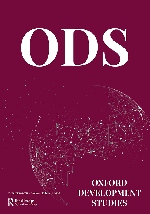
Join Kate Dunton, Head of Learning at the Sainsbury Centre for Visual Arts (SCVA), on a virtual reality tour around some of the art works at the SCVA, located on the UEA campus.
Delegates will have the chance to be shown display pieces in the permanent collection and invited to think about they would normally encounter them in the collection through the displays and labelling; the overarching narrative of Robert and Lisa Sainsbury as Collectors and benefactors; and how the work is described in the SCVA catalogue.
Kate will also demonstrate how the SCVA's current resident artist, Sethembile Msezane, has used one of the pieces as a starting point for a new artwork - which will be newly on display in the gallery - which strongly critiques colonial collecting and display practices, reclaiming it as part of her ancestry and spirituality and reinstating the validity of African scholarship and ways of thinking.
Following the virtual tour, attendees can ask questions and join in a discussion around the question: Can museums ever truly decolonise?
You might like to take a look at this film made as part of the Future and Form project led by the Department of Literature, Drama and Creative Writing at UEA. Home - Future and Form Writer Ayòbámi Adébáyò chose an Ibeji Figure in the Sainsbury Centre collection as a starting point for her project.
Hear Ayòbámi talk about the project here: https://youtu.be/9hWETs4x37U
And watch the film she made here: https://youtu.be/bvWCEi77B78
All members of the association are invited, indeed encouraged, to attend the annual general meeting of the association. Elections for new Council members will take place during the AGM.
View the agenda here.
You can see the minutes of last year's AGM here.
Please read the bios and statements of the Council candidates here.
After the meeting the DSA President will award the winners of the DSA dissertation annual prize for their best Masters level dissertations in development studies or development economics nominated by DSA institutional members. At DSA2021 we shall congratulate the joint winners of the 2021 prize: Suzanne Loader, (Centre for African Studies, University of Edinburgh) and Adela Syslova (Development Studies Department, SOAS). Suzanne will be presenting her work “Conflict or coexistence? A comparative analysis of depictions of human-wildlife interactions in the Kenyan media landscape” at the conference in Panel P07a on 30th June and Adela will present on “Whose Sustainability? Political Economy of renewable energy transitions in Morocco and Algeria” in P32a on 28th June 2021.
Delegates are invited to join in the House of Games social event, a fun way to get to know others and share a virtual drink with one another!
Denys Lasdun created UEA's campus. It is an extraordinary piece of work by the postwar British architect. Inspired by his commitment to universal, challenging spaces, and a good amount of concrete we have put together a quiz like no other. We will be organised into teams, there will be activities, and spaces for political critique. There will even a chance to show off your knowledge of one of the finest medieval cities in Northern Europe, the storied home of Alan Partridge, and birthplace of the foundational sociologist Harriet Martineau.